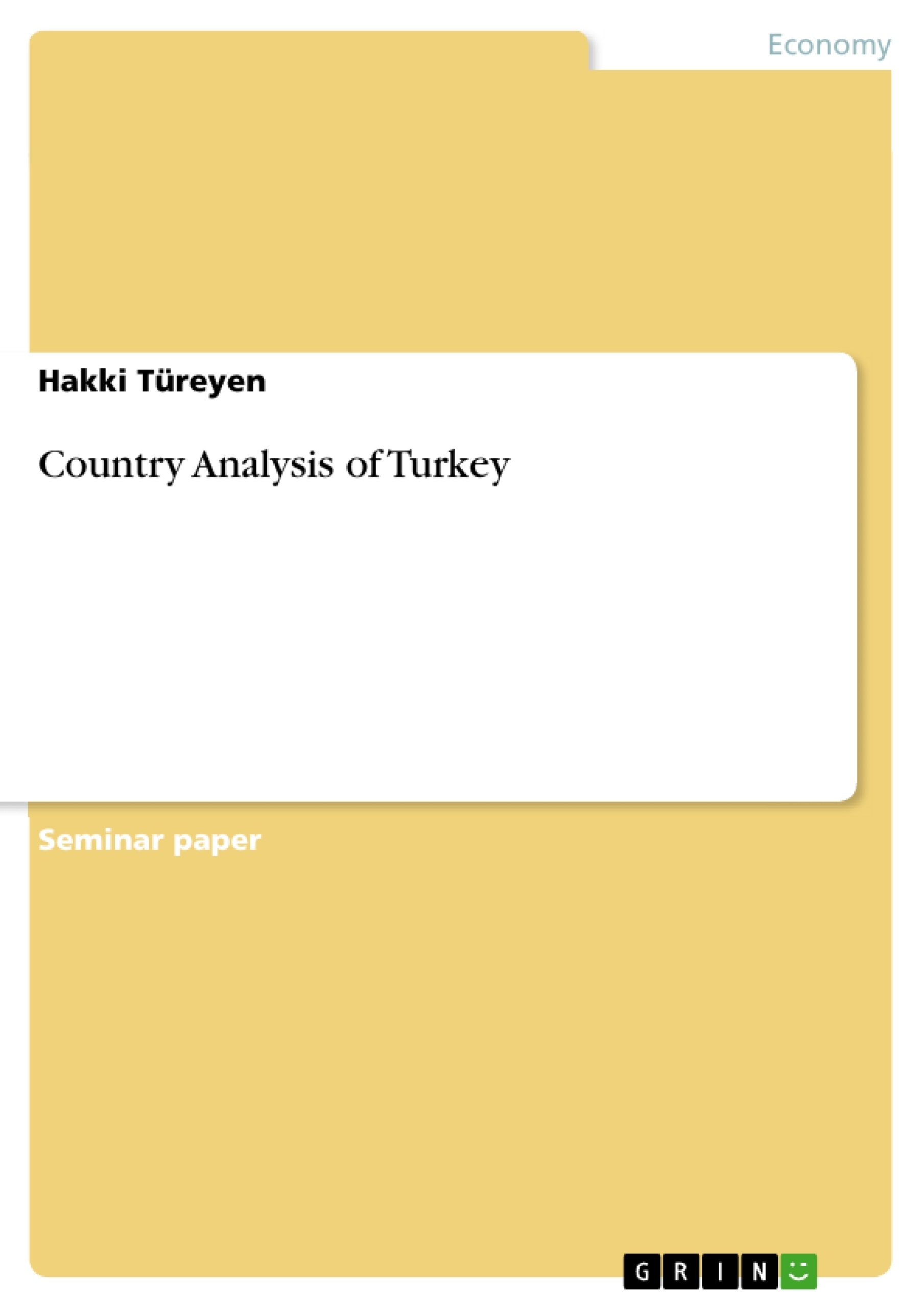The importance of Turkey has risen steadily in recent years. The emerging market is the 17th largest economy in the world and plays the role of a strategic partner between the West and the Middle East. This scientific paper analyses Turkey from a business perspective. With a PESTLE analysis, an overview of Turkey is provided and strengths, weaknesses, opportunities and risks of an investment in the country are illustrated with a SWOT analysis.
Inhaltsverzeichnis (Table of Contents)
- 1 Introduction
- 2 PESTEL Analysis
- 2.1 Political
- 2.2 Economic
- 2.3 Socio-Cultural
- 2.4 Technological
- 2.5 Environmental
- 2.6 Legal
- 4 Conclusion
Zielsetzung und Themenschwerpunkte (Objectives and Key Themes)
This scientific paper examines Turkey from a business perspective with the aim of providing a comprehensive overview of the country's investment potential. It utilizes a PESTLE analysis to assess the political, economic, social, technological, environmental, and legal factors that influence Turkey's business environment.
- Turkey's economic and political landscape
- Strengths, weaknesses, opportunities, and risks associated with investing in Turkey
- The role of Turkey as a strategic partner between the West and the Middle East
- The impact of various PESTEL factors on Turkey's business environment
- An analysis of Turkey's economic and political stability
Zusammenfassung der Kapitel (Chapter Summaries)
- Chapter 1: Introduction: This chapter provides a brief introduction to Turkey's growing importance in the global economy and highlights its strategic position as a bridge between the West and the Middle East.
- Chapter 2: PESTEL Analysis: This chapter delves into the key factors influencing Turkey's business environment. It examines political stability, economic trends, social dynamics, technological advancements, environmental concerns, and legal regulations.
- 2.1 Political: This section analyzes Turkey's political system, government policies, and the political landscape's impact on businesses.
- 2.2 Economic: This section examines Turkey's economic performance, growth prospects, and the key economic indicators that influence business decisions.
- 2.3 Socio-Cultural: This section explores the social and cultural factors shaping Turkey's business environment, including demographics, consumer behavior, and cultural values.
- 2.4 Technological: This section evaluates Turkey's technological infrastructure, innovation capacity, and the role of technology in driving economic growth.
- 2.5 Environmental: This section analyzes environmental regulations, sustainability initiatives, and the environmental risks associated with doing business in Turkey.
- 2.6 Legal: This section examines Turkey's legal framework, regulatory environment, and the legal considerations for businesses operating in the country.
Schlüsselwörter (Keywords)
Turkey, PESTEL analysis, SWOT analysis, emerging market, strategic partner, investment potential, political stability, economic growth, social dynamics, technological advancement, environmental regulations, legal framework, business environment.
Frequently Asked Questions
Why is Turkey considered a strategic partner for international business?
Turkey serves as a bridge between the West and the Middle East and is the 17th largest economy in the world, making it a key emerging market.
What are the main components of the PESTLE analysis for Turkey?
The analysis examines the Political stability, Economic growth, Socio-cultural dynamics, Technological infrastructure, Environmental regulations, and Legal framework of the country.
What are the opportunities for investors in Turkey?
Opportunities include a large, young population, a growing domestic market, and its role as a regional hub for trade and logistics.
What risks are identified in the SWOT analysis?
Investors should consider risks related to political volatility, economic indicators like inflation, and legal complexities in the regulatory environment.
How does Turkey's technological landscape affect business?
The paper evaluates Turkey's innovation capacity and technological infrastructure as drivers for economic growth and modernization.
What socio-cultural factors are important for the Turkish market?
Understanding Turkish demographics, consumer behavior, and cultural values is crucial for successful market entry and long-term investment.
- Arbeit zitieren
- Hakki Türeyen (Autor:in), 2014, Country Analysis of Turkey, München, GRIN Verlag, https://www.grin.com/document/272837



